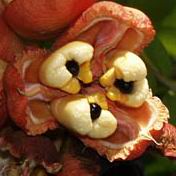In my last post, I mentioned that Cindy and I just spent a week in Jamaica, researching life in the Caribbean while sampling the occasional rum drink. One of the first things we discovered was something called ackee. It came on my plate as part of a traditional Jamaican breakfast our first morning on the island. Mixed with saltfish, tomatoes and onions, looking like scrambled eggs but with a taste faintly reminiscent of squash, ackee had me hooked from the first bite. I asked our waiter about it and he informed me that ackee was actually a fruit and was a very traditional Jamaican dish. In fact, its one of Jamaica’s major exports. From that morning on, I had ackee at every opportunity. Furthermore, given how the world wide web has turned the planet into a global community, I made a mental note to search the internet as soon as we returned home to see if ackee was something we could have shipped to us.
So imagine my shock when I started researching ackee upon our return home and the first thing that I learned about it was that it was, well, poisonous! It seems that if eaten before the fruit has entirely ripened, the soft fleshy interior that I was enjoying so much over breakfast is quite toxic. And I’m not just talking hanging-over-the-toilet-heaving-your-breakfast-up toxic, I’m talking coma-followed-by-death toxic. Compounds in the seeds, husks and unripened flesh cause severe hypoglycemia, resulting in a condition that is very similar to diabetic shock. In fact, as recently as 2011 23 Jamaicans died and almost 200 were sickened by ackee poisoning after an unusually cool January caused the fruit to ripen later than usual. And this was in a population that is well educated about the dangers of eating the unripe fruit.
To be sure, ackee can be eaten safely provided it’s prepared correctly (as is obvious from the fact that it’s a staple of the Jamaican diet). Once it’s ripened the soft fleshy interior is safe to eat (though the seeds and husks never are) and ackee bound for export is tested for hypoglycin, the toxic compound responsible for these ill effects. But given that there are many other delectable Jamaican dishes that don’t make you risk death to enjoy them, I’d just as soon not risk someone having a bad day and accidentally letting some substandard ackee get through.
I mean, this stuff is really good, but it’s not to die for.



